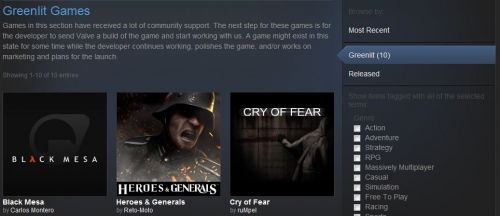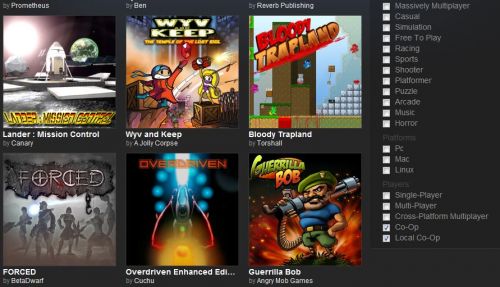Crowd-sourcing the Steam selection process via Greenlight is a brilliant idea, if you're Valve. Valve is big on metrics, and before, it was hard to quantify whether an indie game's supporter base was a very vocal minority or if there actually was genuine demand for the title... In doing so, Valve is also helping to encourage indies to start community building pre-release, which can only ever be positive.
- Dylan Barker, Game Developer, Cadenza Interactive
Signal to Noise Ratio (Living in a Modder’s Paradise?)
Perusing the 700 games that have already been submitted to Greenlight is rather revealing. A fair portion of these games are constructed as mods to existing games released by Valve (e.g., Half-Life) or using the Source SDK. The developers of these mods currently offer them from a variety of sources for free, and indeed state within the written description on the Greenlight page that the mod will continue to be free. This raises a rather important question for Valve to answer: what constitutes a game?
That question isn’t meant to imply that mods aren’t games, as there have certainly been a number of mods released that could be considered full-fledged games in their own right (DoTA is a great example); it’s more to raise the idea that a game that’s built using existing tools versus a game that’s build from the ground up would have different assumptions and ideas surrounding it. Additionally, if part of the idea behind the Greenlight program is for independent developers to have a chance to “make it big,” then wouldn’t shifting attention to a free mod deflate some of that?
The submission of these mods definitely serves to increase the sheer number of games that gamers would have to sift through in order to find those that they would be interested in seeing through to completion. All of that noise can make it difficult for any one game to really make it through, unless it receives a lot of attention from other sources (e.g., gaming sites). This is where the modders have a slight advantage as the modding community within PC gaming is quite large. Thus, any new, fully-developed game that’s submitted to Greenlight would have to compete with the attention and votes that a popular mod would receive, in addition to the other games out there that are already receiving attention. A better search tool within Greenlight that would allow gamers to maybe search for games versus mods may prove to be beneficial, for a variety of reasons, though there is still an underlying issue that Valve may need to address at some point.
Again, none of this is to discourage or stifle submissions, merely to address some of the potential problems and issues surrounding Greenlight as it currently exists. Fortunately, there may be hope.
[Greenlight] seems like a good thing for indies, because it gives you a place to organize your fans, generates feedback on your game's marketability, and helps some games get noticed by Steam. Plus, Greenlight helps Steam identify users want to buy your game, and that means they can target exactly those users once you launch. It's an interesting experiment, and we'll be watching carefully to see what comes of it!
- Tim Ambrogi, Developer, Final Form Games
The Potential and What the Future May Hold
Though the Steam Greenlight service is only 2 weeks old, it has already seen a few changes in just that brief span of time. The $100 fee, for instance, was an almost immediate reaction to the sheer number of submissions, many of which were jokes/fraudulent, that came in within hours of the system going live. The voting system also saw some slight tweaks, as initially you could see the yes vs. no votes for a game. While these tweaks can be good or bad, depending on to whom you speak, the general consensus does seem to be that at least Valve is reacting and reacting quickly. Valve may not have all the answers just yet, but it’s not unreasonable for one to have hopes that they might at some point down the line.
Personally, I see Greenlight as having the potential to do what it’s currently doing (with some improvements), and adding in some Kickstarter-like features. Many of the games that have interested me thus far actually have Kickstarter campaigns and it raises the question in my mind, “if I’m interested in seeing this come to Steam, why am I not contributing more than just a vote to make that happen?” See, even if I do contribute to the Kickstarter and the game is successfully funded and made, it still doesn’t mean that it’ll end up on Steam. Money is a powerful tool/voice (“What's worth doing is worth doing for money” - Gordon Gecko) and I would think that there would be no better indicator of a game that could make it on Steam than how much I and others would be willing to pay to make it so.
For now, though, Greenlight is more of an, as one indie developer put it, “El Dorado” - a dream and hope for many indie developers to transition game development from passion to profession. As the system currently exists, too, that dream may be further off than they first realized. Regardless, Greenlight is a valuable outlet for gamers to make their voices heard and to vote for what kind of games they’d like to see be made, as well as being a more structured approach for developers to hear that kind of feedback. The barrier between game player and game developer has thinned more and more as the years have gone on, and Greenlight could very well be the system that provides the kind of constructive and creative environment for those with the passion and drive to make the transition able to do so.

